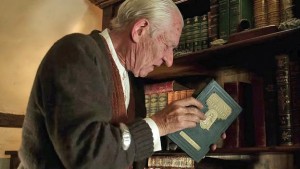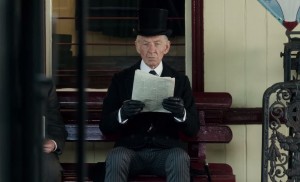
Who says Sherlock Holmes never left a case unsolved? The new film Mr. Holmes uses the famous no-nonsense Arthur Conan Doyle character to tell a tale about the importance of myth and fiction in everyday life. It isn’t a gripping thriller nor is it a groundbreaking drama, but this is a beautifully photographed production featuring strong, compelling performances and an interesting message.
 As the movie begins, a retired and cranky Sherlock Holmes (Ian McKellen) is living a mostly solitary life near the sea. Suffering from dizzy spells and memory lapses, he struggles to write a novel about the true story behind his final case, one that he never solved. The only trouble is that all of his associates have passed away and he can’t remember the details. As he attempts to stave off his worsening condition, he befriends Roger (Milo Parker), the son of his housekeeper (Laura Linney) and writes out the fragmented pieces of the mystery.
As the movie begins, a retired and cranky Sherlock Holmes (Ian McKellen) is living a mostly solitary life near the sea. Suffering from dizzy spells and memory lapses, he struggles to write a novel about the true story behind his final case, one that he never solved. The only trouble is that all of his associates have passed away and he can’t remember the details. As he attempts to stave off his worsening condition, he befriends Roger (Milo Parker), the son of his housekeeper (Laura Linney) and writes out the fragmented pieces of the mystery.
There is a case that unfolds in flashbacks, but it’s not a particularly exciting assignment with a whole lot of double-crosses, red herrings and sinister moustache-twirling villains. The case (and the movie by extension) has a subtle impact, but it isn’t as big or showy as one would anticipate. Instead, this is an understated story about an elderly man filled with regret and coming to terms with his relationships in life.
 As expected, the cast are all excellent. McKellen is always enjoyable to watch, balancing his mental illness with a dryly witty sense of humor. His barbs with the housekeeper are amusing, and there’s a lot of good material derived from observations about bees. In fact, an entire subplot about strange deaths in the ex-detective’s bee hive plays an important role late in the film.
As expected, the cast are all excellent. McKellen is always enjoyable to watch, balancing his mental illness with a dryly witty sense of humor. His barbs with the housekeeper are amusing, and there’s a lot of good material derived from observations about bees. In fact, an entire subplot about strange deaths in the ex-detective’s bee hive plays an important role late in the film.
Parker is also strong as the young boy who helps the senior lower his guard and eventually keep his mind spry (for a least a little while longer). The English seaside is wonderfully filmed, with the craggy and striking White Cliffs of Dover visible in the background – and perhaps being used as a metaphor for the character’s own personal wall separating him from others.
And that seems to be what it’s all about when all is said and done. Early on, the cool and clinical lead states that he is only interested in “facts” and looks upon the late Dr. Watson’s wildly fantastical tales of their exploits with disdain. However, as events progress, he comes to a different conclusion about the necessity and emotional need for some exaggeration of the truth. It’s a sweet message, quietly delivered.
Personally, while Mr. Holmes doesn’t feature a lot of dynamic intrigue, it is an expertly handled drama. The latest tale of the world famous detective may not stand as one of his greatest mysteries, but it is an effective and interesting case study.


